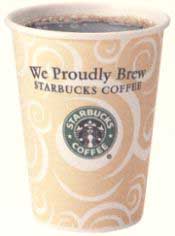The favourite target of WTO protesters is actually far more diverse than the anti-globalization movement. Kim Fellner looks into the contradictions of coffee, class, and race.
 |
In an article published in Colorlines magazine, reporter Kim Fellner ponders the ‘Starbucks Paradox’ — is the coffee behemoth inherently evil just because it’s a big corporation? Or, is Starbucks actually a diverse company that offers viable career opportunities for those of all races and classes?
The knock on Starbucks? WTO protesters accuse Starbucks of buying coffee at prices that won’t sustain farmers’ livelihoods; purchasing from farms that degrade the environment; causing neighbourhoods to gentrify and small cafés to wither; and representing the mega-branding that’s killing small businesses and homogenizing the world.
Ms. Fellner’s response to the concerns raised above encompasses Starbucks’ record on race, class, politics, human rights and the environment; as well as employees’ working conditions and benefits.
In the Colorlines article, Jef Keighley, a national representative for the Canadian Automobile Workers, describes his experiences organizing Starbucks in British Columbia, where the union is in a drawn-out contract negotiation covering 10 Vancouver stores. “We used to have 12 stores,” he says, “but the company has had a hand in organizing decertifications at two of those stores, even selecting and paying for the lawyer. We’ve been at the Labour Board for a year and a half.”
Is Starbucks equivalent to Wal-Mart, given its hyper-aggressive expansion, especially abroad, and a marketing plan which has positioned the company as a symbol of the ‘Americanization of the world’? Read Ms. Fellner’s article for an expansive and thoughtful answer to that, and other, questions.